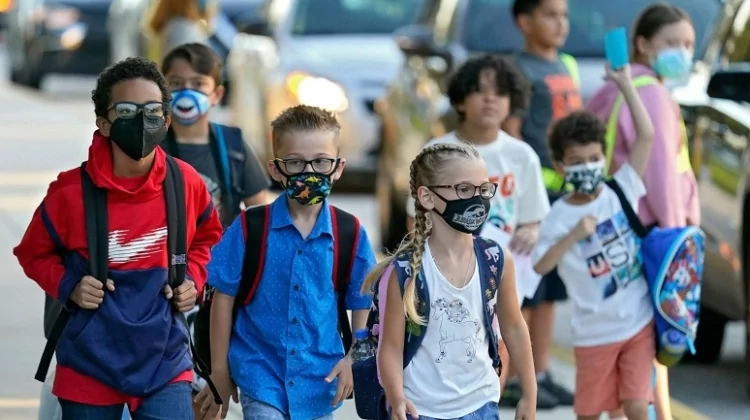The Covid Lockdown Disaster: Three Years Later; The CDC’s Long-Covid Deception, and other C-Virus related stories
The Covid Lockdown Disaster: Three Years Later:
There has been nothing but awful news about the unnecessary Covid-related shutdown of American schools. Study after study and a mass of anecdotal evidence show the harm done by the forced lockdowns.
Yet more research, released in January, extends the grim scenario. A meta-analysis of 42 studies across 15 countries assessed the magnitude of learning deficits during the pandemic, and finds “a substantial overall learning deficit…which arose early in the pandemic and persists over time. Learning deficits are particularly large among children from low socio-economic backgrounds.”
The analysis finds the losses are larger in math than in reading and in middle-income countries relative to high-income countries. The learning progress of school-aged children slowed substantially during the pandemic and overall, students lost about 35%, of a school year’s worth of learning. One of the studies included in the analysis found that the average public school student in third grade through eighth grade lost half a year of math learning and a quarter of a year in reading.
Two countries, Sweden and Denmark, managed to avoid the upheaval. Swedish children experienced no learning loss because they were not subjected to mass school closures during the pandemic. While Denmark did have closures, it is theorized that the lack of learning loss could be attributed to the country’s “reliable digital infrastructure with Denmark being one of the absolute top-scorers in digital skills, broadband connectivity, and digital public services in Europe.”
Another recent study by the Institute of Educational Studies’ School Pulse Panel reveals that about half the students in the U.S. entered school in September 2022 below grade level in at least one subject.
The findings from the School Pulse Panel are very similar to the results of a survey compiled by the Centers for Disease Control and Prevention in April 2022. According to the CDC, a survey of nationally representative public schools showed that 49% of students began the 2022-23 school year behind grade level in at least one subject. The percentage is significantly higher compared to a typical pre-pandemic year, in which just over a third of students are behind. —>READ MORE HERE
The CDC’s Long-Covid Deception:
A recent study exaggerates the incidence of postviral symptoms among young adults and deflects attention from misconceived pandemic policies
Many liberals label themselves “pro-science” as if that’s a political position. Then again, so many putatively scientific studies seem intended to promote progressive policies rather than advance scientific knowledge. Such studies then get amplified by the media and self-appointed experts on social media.
Consider a recent study from the Centers for Disease Control and Prevention that claims to find that nearly 36% of Covid cases among students, faculty and staff at George Washington University resulted in “long Covid.” The study suggests that young, healthy people face a high risk of chronic debilitating symptoms after infection despite being at low risk of getting severely ill with the virus.
The study also finds that the unvaccinated were at more than twice as high a risk of developing long Covid as those fully vaccinated who had gotten boosters. This sounds plausible. But drill down, and it becomes clear that the evidence is too thin to draw any conclusions.
Like many colleges, George Washington University held classes online during the first year of the pandemic even as some students returned to campus. Those on campus were required to undergo weekly Covid testing. During the 2021-22 school year, classrooms reopened but students were required to be vaccinated and later boosted.
The college recorded 4,800 Covid cases between August 2020‒and February 2022. Those who tested positive were later asked to complete 15- to 20-minute surveys about their health and behavioral changes. Only one-third completed the surveys, and those who did might have been more likely to report lingering health problems—a phenomenon known as nonresponse bias.
The study suffers from two other major methodological problems. First, it doesn’t include a control group of students and faculty that weren’t infected. The finding that nearly 36% reported long Covid symptoms is meaningless without such a sample to determine how common such symptoms were among people who never had Covid.
Long Covid in general isn’t well-defined, but the study defines it expansively to include problems common among college students—difficulty making decisions, fatigue, anxiety, sadness, trouble sleeping and the catch-all “other symptoms.” If a student reported at least one physical or psychological problem, he was classified as having long Covid. —>READ MORE HERE
Follow links below to relevant/related stories and resources:
Food Companies to Ex-Employees: Come Back, Please
Do the right thing, Mayor Eric Adams, and rehire the heroes fired over the vaccine
USA TODAY: Coronavirus Updates
YAHOO NEWS: Coronavirus Live Updates
NEW YORK POST: Coronavirus The Latest







Comments are closed.